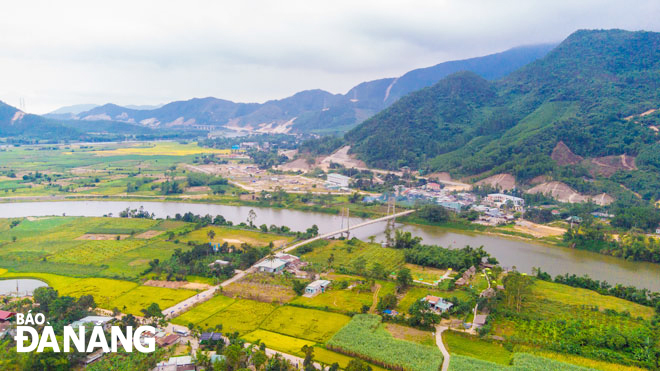Authorities in Da Nang’s Hoa Vang District and people involving community-based tourism are always trying their efforts to ensure the harmony between protecting nature and exploiting indigenous resources. For them, treating mountains, forests and nature well is the guideline for promoting the development of sustainable tourism.

Hoa Bac mountains and forests are valuable resources for the development of community-based tourism in Hoa Vang District. Photo: X.S
Tourism combined with forest protection
Hoa Bac Commune is one of the three clusters of community-based tourism in Hoa Vang District. The locality is now home to 5 eco-tourism and 16 community-based tourism areas, attracting an annual average of 30,000 visitors.
The Hoa Bac Eco-Agriculture and Community-based Tourism Cooperative has greatly contributed to the development of tourism combining nature and the traditional cultural identity of the Co Tu people.
Established in March 2023, the cooperative has 19 official members and 275 associate members who are responsible for connecting agricultural teams, traditional craft teams, Co Tu people’s traditional culture, cuisine, accommodation establishments and tour providers.
The purpose of the cooperative is to promote traditional values; preserve indigenous values; and create livelihoods for the community, towards conserving watershed forests and develop sustainable nature.
Locals have been facilitated to take part in training courses on culinary and housekeeping operations offered by the municipal Department of Tourism or those on communications activities by the Da Nang University of Architecture in order to improve their tourism capacity. With the central product being community-based tourism, after 1 year of operation, the cooperative welcomed nearly 5,000 visitors.
Ms. Do Thi Huyen Tram, Director of the Hoa Bac Ecological Agriculture and Community-based Tourism Cooperative, said that in the past, when the natural forest area was large, people relied on the forest to live. The forest provided bark for weaving, food and medicinal plants. Irrigation and drinking water also flow from the forest. Nowadays, growing acacia affects the quality of the growing soil layers because acacia trees cannot retain water. When the forest land loses its fertility, human life is affected accordingly.
Therefore, Hoa Bac people understand that if there is a lack of water or polluted water, they will be the first to suffer the consequences.
Treating nature well
"To ensure the safety of guests and to avoid disrupting the tranquility of the forest, each trekking trip is only organised for less than 15 people," shared Mr. Ngo Khai Hoang, General Director of the Wildtrek Tourism Services JSC.
With this type of trekking in the forests in Da Nang’s Hoa Vang District and Quang Nam Province, the company integrates stories about the rich forest flora with instructions on survival skills in the wild, emphasising the importance of forests with ecosystems and people. Also, visitors are advised to remove all items from the forest, especially plastic waste.
Mr. Hoang said, on some trips, they combine to clean up trash left behind by foresters.
‘Treating nature well’ is also the criterion set by the Banarita Glamping Farm eco-tourism area combined with agricultural development in Hoa Phu Commune which is the city's first tourism OCOP product.
The 5-hectare farm with fruit trees, vegetable gardens and fish ponds combined with outdoor picnic and camping areas attracts 2,000 - 3,000 visitors each month. It is used to be a land of acacia plantations in the middle of mountains and forests.
The launching pad for this model is Resolution No. 82/2021/NQ-HDND dated December 17, 2021 adopted by the Da Nang People's Council on piloting the exploitation of tourism services combined with the development of agriculture, forestry, and aquaculture in Hoa Vang District.
Mr. Le Thanh Tuan, the manager of the farm, said that the tourism model was born when there is an increasing need for going to outskirts to rest and relax with nature. In the spirit of respect for nature, he and his companions keep the slopes, undulating gardens or winding roads in the farm..
From the story of community-based tourism in Da Nang from Hoa Bac Commune, Dr. Nguyen Ba Long from the University of Forestry stressed the need for local authorities to develop a master plan on detailed areas which conservation and preservation are needed in a bid to ensure harmony between natural and social factors.
Reporting by Xuan Son - Translating by M.Dung